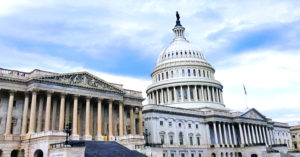 Washington, DC – President Joe Biden on March 15, 2022 signed the most consequential campus sexual violence legislation in a decade into law as part of the Consolidated Appropriations Act, 2022 government funding bill (Public Law No: 117-103).
Washington, DC – President Joe Biden on March 15, 2022 signed the most consequential campus sexual violence legislation in a decade into law as part of the Consolidated Appropriations Act, 2022 government funding bill (Public Law No: 117-103).
The measure includes provisions creating a national campus climate survey for institutions of higher education, establishes a Task Force on Sexual Violence in Education, authorizes grants for a two-year test program for police training on trauma-informed investigations, extends the Grants to Combat Violent Crimes on Campuses program, and requires the Education Department to produce a report on best practices regarding domestic violence, dating violence, sexual assault, and stalking on campuses.
The last time Congress passed significant campus safety legislation was as part of the Violence Against Women Reauthorization Act of 2013 which updated the Jeanne Clery Act‘s Campus Sexual Assault Victims’ Bill of Rights.
Campus Climate Surveys & Federal Task Force
The campus climate survey and task force provisions were based on the bi-partisan Hold Accountable and Lend Transparency (HALT) on Campus Sexual Violence Act. The HALT Act, sponsored by Congresswoman Jackie Speier (D-CA) and Congressman Brian Fitzpatrick (R-PA), was first introduced in 2014. The provisions enacted last week:
- Direct the Secretary of Education to establish a standardized climate survey for institutions of higher education to administer to students on their experiences with sexual assault, sexual harassment, domestic violence, stalking, and dating violence. Each institution of higher education that receives federal funding will be required to administer the survey biannually and the results of the surveys will be published for public consumption.
- Establish an Interagency Task Force on Sexual Violence in Education to provide pertinent information to the government, public, and educational institutions on campus sexual violence prevention and response, as well as how to better assist survivors.
SAFE Campuses, LLC will provide additional analysis of these provisions in the near future including the timeframe for their implementation.
Trauma-Informed Investigations
Law enforcement agencies, including campus police, will be eligible for federal grants to improve how they investigate sexual assault cases, under legislation named for a former University of Minnesota student and spearheaded by Minnesota lawmakers including U.S. Sen. Amy Klobuchar, D-Minn., and Republican U.S. Rep. Tom Emmer. The Abby Honold Act, signed into law as part of the government funding bill, establishes a two-year test program for police training on trauma-informed investigations into sexual assault, domestic violence, dating violence and stalking. The measure includes a clause requiring that “Nothing in this section shall be construed to interfere with the due process rights of any individual.”
“I am so grateful to finally see a conclusion here, and really a new beginning, I feel like, for so many people,” Honold, 27, said. “I want other survivors to be able to get the absolute best treatment that they can, from the very beginning.”
Campus Grants Program
The Grants to Reduce Sexual Assault, Domestic Violence, Dating Violence, and Stalking on Campus Program has been reauthorized through fiscal year 2027. Congress also appropriated $22 million for the program this year with $11 million of that funding directed for grants to Historically Black Colleges and Universities, Hispanic-Serving Institutions, and Tribal colleges.
Best Practices Report
The U.S. Department of Education is directed to produce and submit to Congress a report on best practices regarding domestic violence, dating violence, sexual assault, and stalking on campuses. The report, due not later than 1 year after the date of enactment, will evaluate campus programs and provide an assessment of best practices to be made publicly available as a resource for colleges and universities.
